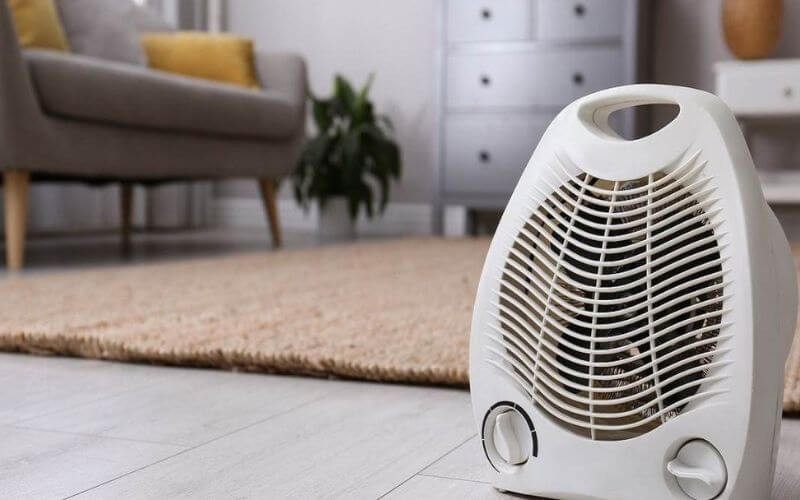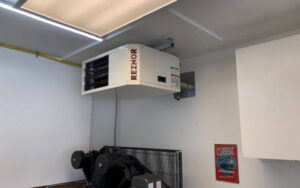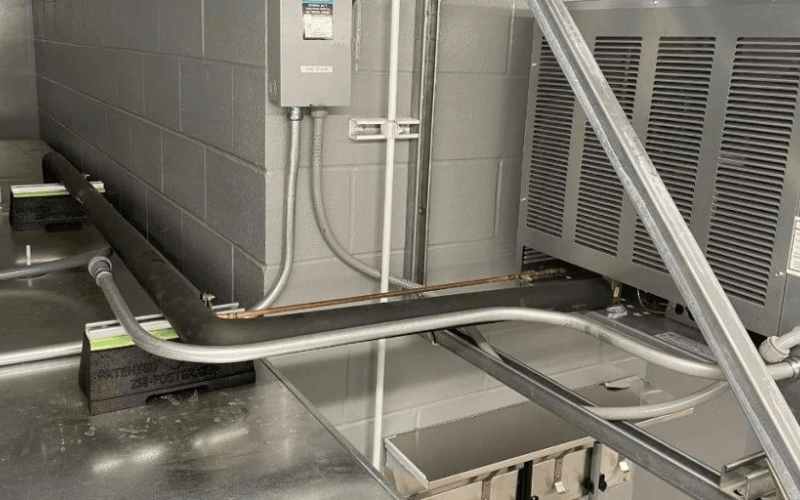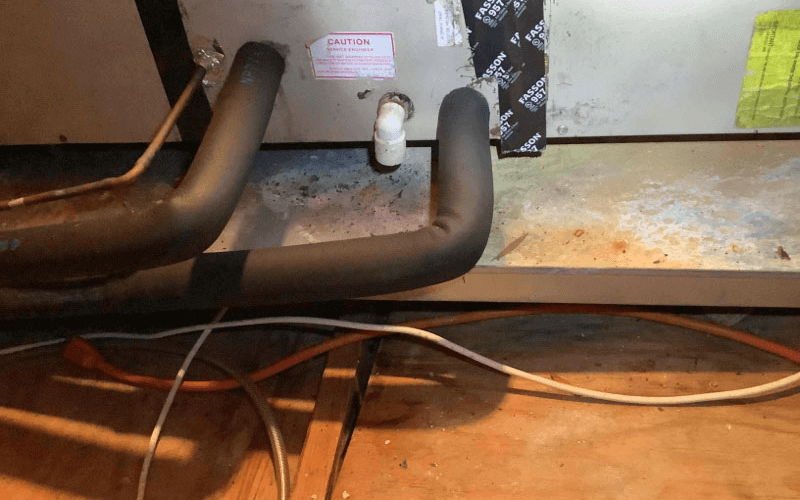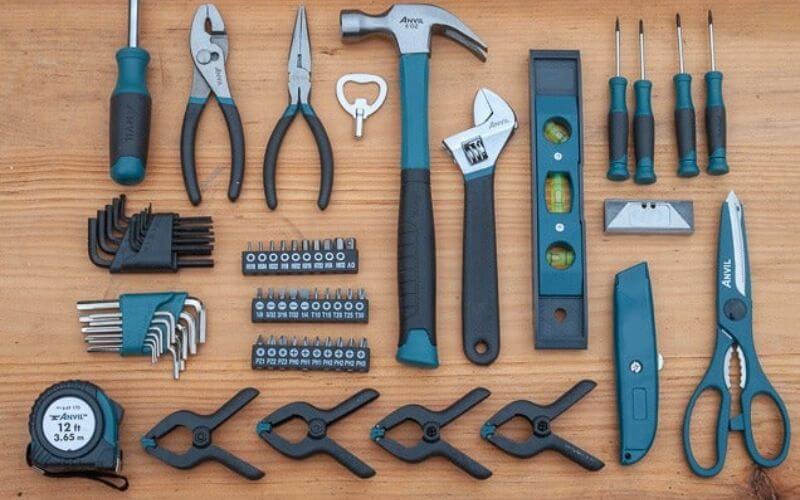People frequently turn to space heaters when they want to warm up an office or small room in their home. However, you might discover that your space heater keeps shutting off after using it for a while. The question is, why does the new space heater keep turning out?
If a space heater overheats, it will turn off. A clogged air filter that limits airflow to the heater can result in overheating. Without a constant flow of cool air, the heater’s elements will get too hot and start to automatically shut off for safety.
However, overheating isn’t the only factor causing your electric space heater to keep shutting off. Read on to go over additional causes for your space heater to shut off and their solutions.
Table of Contents
ToggleWhy Do Space Heaters Keep Turning Off?
Now, before you decide to take on this problem and approach it with some much-needed zeal, you must first comprehend the variety of reasons why your heater frequently shuts off on its own.
| Image | Product | Features | Price |
|
Best Seller

|
Dreo Smart Wall Heater, Electric Space Heater for Bedroom 1500W |
120° Vertical Oscillation, Adjustable Thermostat, |
$129.99
|
|
Best Seller
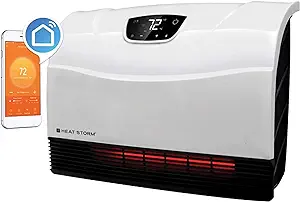
|
Heat Storm HS-1500-PHX-WIFI Infrared Heater |
1500-PHX-WIFI Infrared Heater, Wifi Wall Mounted |
$104.57 |
|
Best Seller
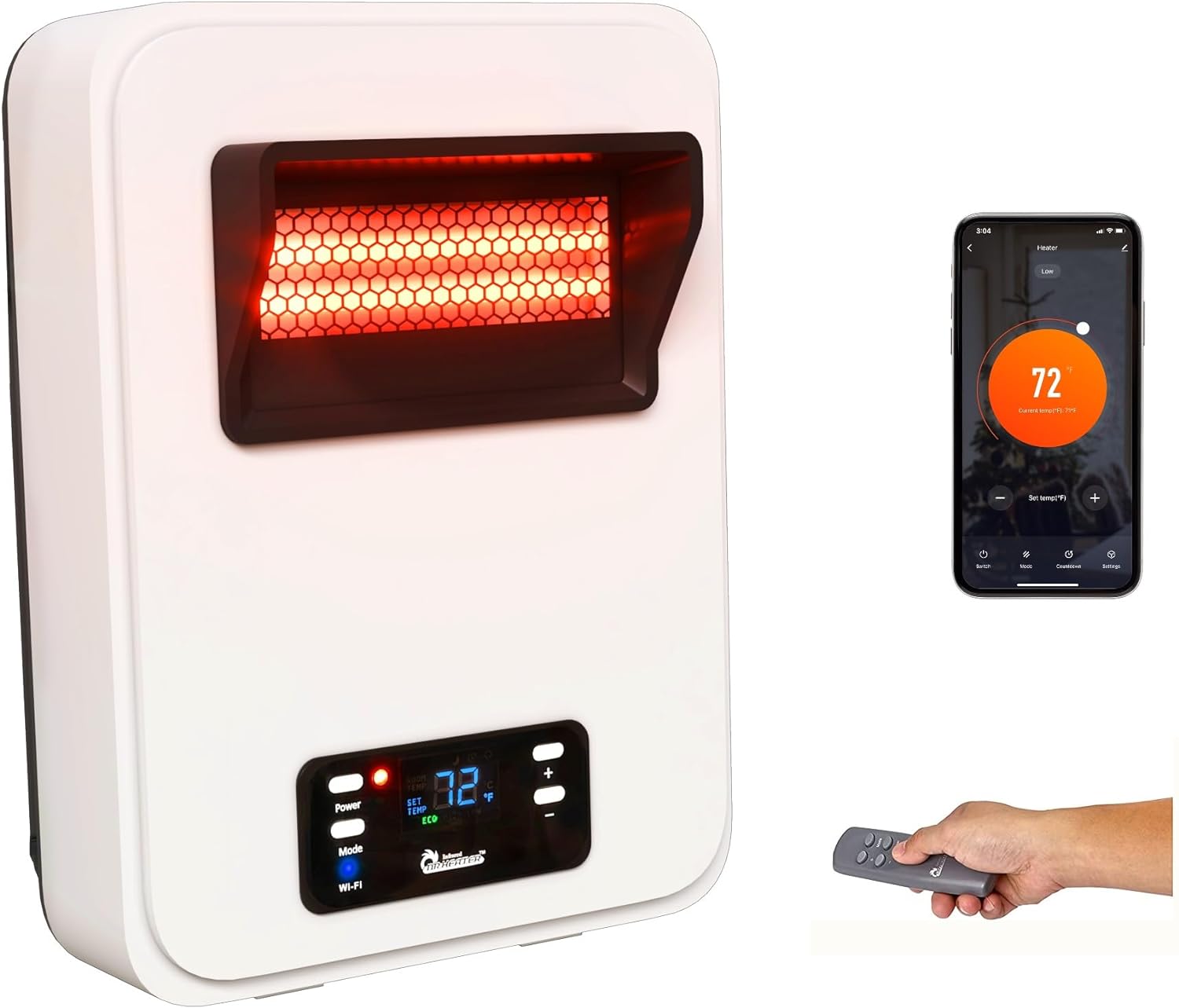
|
nfrared Heater with WiFi – Wall Heater – Electric Heaters for Indoor Use |
Bedroom, Small Room,- Energy Saving 1500 Watt PTC Quartz Heater |
$119.99 |
|
Best Seller

|
|
PTC Ceramic Electric Heater for Bedroom with Thermostat, |
$49.99 |
|
Best Seller
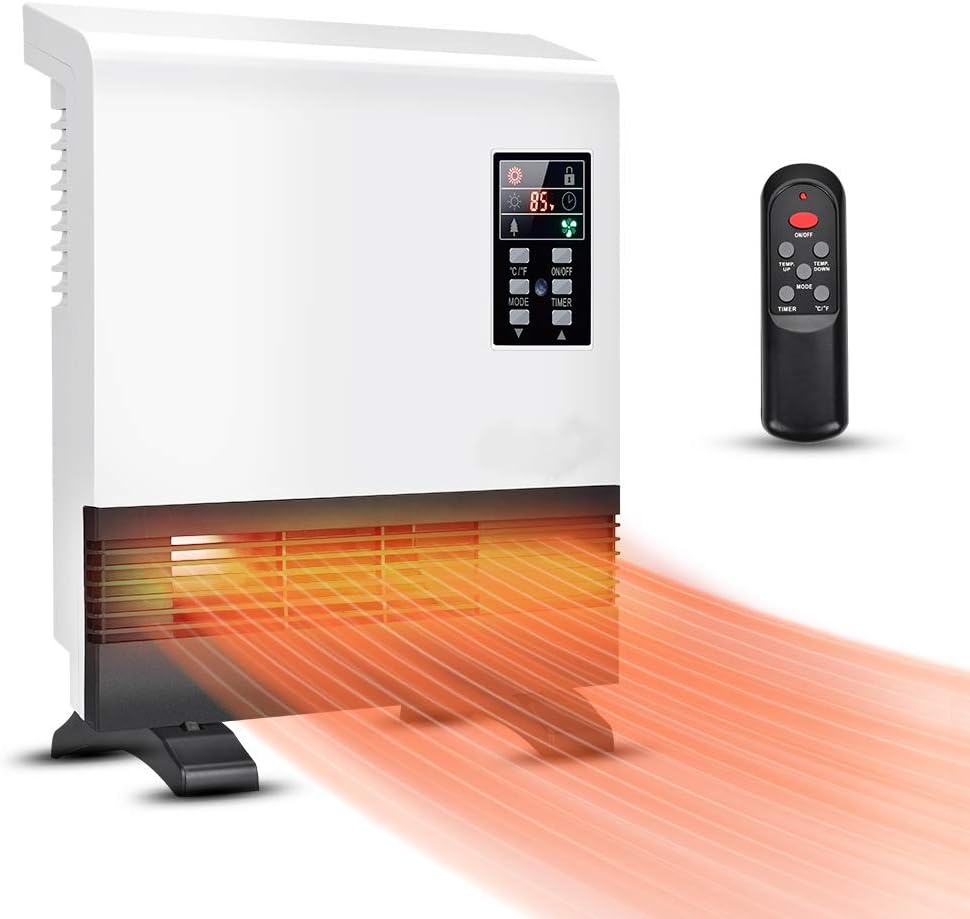
|
Airchoice Electric Heater, 1500W Space Heater, Wall Mounted Room Heater with Stand, |
Energy Saving, Timer, 3 Modes, Quick Heat Electric Space Heater, |
$48.35 |
Overheating:
Your space heater will have an air filter on the front. Your heater may have a dirty air filter if it keeps turning on and off. The burning smell that an air filter emits when clogged is very noticeable.
Cool air from the room cannot reach the interior elements through the vents if the filter is clogged with dirt and dust. The heater’s components will glow brighter than usual in red or orange because they aren’t cooling properly.
The excessive heat will activate the heater’s built-in safety shutoff. Since there is no time for the heater to cool down after being turned off, it will immediately turn back on after being turned off.
Insufficient Power Source:
One of the main causes of a nonconforming space heater is a bad or insufficient power source. Power sources are frequently disregarded in favor of heater internal issues.
But occasionally, the issue is as straightforward as a power outlet that is faulty or damaged and requires urgent repair. The typical space heating operates and produces heat with an efficiency of up to 1500 Watts (W) or 1.5 kW (kilowatts).
The power used by the appliance you own needs to be noted, even though this number depends greatly on the size of the space heater.
Sometimes, the space heater’s voltage (V) and wattage (W) are incompatible with the electrical outlet it is plugged into.
In other instances, the socket itself has likely been harmed; keep an eye out for any charring or brownish “stains” near the prong-shaped outlets of the socket. If you notice discoloration, unplug your electric space heaters immediately and seek a qualified electrician’s advice.
Problems with space heaters could also be caused by simple human negligence. We commonly attempt to turn on a heater without first plugging it into an electrical socket. Because of this, you should always check to ensure that your space heater is plugged in and, more importantly, that it is plugged in properly.
A heater plugged in incorrectly or loosely may struggle even to turn on, let alone operate. Always watch for any wear and tear damage or even fraying in the power cords of your heater.
A damaged electrical cord poses a shock hazard to anyone who unintentionally comes into contact with it, making it dangerous. This primarily targets animals or young children who might curiously wrap a sticky finger or brush a paw against an exposed electrical wire.
Clogged Air Filter:
Your electric space heater may also abruptly turn off multiple times if the air filter is dirty or clogged. A dust or debris-clogged air filter will release a rather noxious or unpleasant odor. The smell is the first obvious indication that it’s time to clean your air filter.
Filthy air filters frequently reduce the oscillating airflow through the heater, reducing its internal capacity to cool itself during and after use.
A heater that cannot adequately cool down will quickly overheat, setting off internal sensors and resulting in various other problems, such as a Broken Thermostat and an engaged built-in safety shutoff. As a result, you are strongly advised to clean your dirty air filter every two months, even before it emits any unpleasant odors.
Also, check: Can You Put Diesel In An Oil Furnace?
How to Clean an Air Filter in a Space Heater?
Cleaning the blocked air filter should be simple and easy depending on the space heater you’re using:
- Remove the heater’s power source and let it cool down completely.
- To get rid of stray dust, dust the heater with a duster or a microfiber cloth.
- To remove built-up dirt and grime, spray compressed air onto the filter.
- Using the brush attachment on your vacuum, you can carefully remove dirt from nooks and crannies.
- Before turning the heater back on, clean off any extra dust from the front and back.
The Circuit in Your Home Is Tripping:
Circuit breakers are used in a variety of homes all over the world in place of fuses. Modern homes typically have a single grey box containing a row of neatly arranged switches, with a single primary breaker at the very top.
The main circuit breaker serves as your home’s main control panel for electricity.
Concerning the smaller breakers, each switch is matched to a specific electrical grid that can be found in a particular room of your home, such as the bedroom, living room, kitchen, etc.
An entire breaker may occasionally be set aside for a specific power outlet that supplies a single appliance or another electric-powered device.
When a breaker “trips,” the power supply to the electrical loop in the designated area covered by the breaker is immediately cut off.
A tripped circuit is typically brought on by an increase in electricity flowing through the home’s main grid, such as after a violent thunder or lightning storm.
The tripped breaker serves as a silent protector, keeping the grid from being overloaded with electricity and damaging any equipment or appliances connected to an electrical socket in a specific room or location.
Your space heater won’t turn on if the circuit breaker trips. If you do manage to turn on your space heater, it will probably turn off again shortly after.
You must manually open the breaker box and flip the tripped breaker back to its initial position to bring electricity back into the room and power your space heater.
You will require the assistance of a qualified electrician to replace the switch and reconnect the circuit if the breaker keeps “tripping” or is burned or damaged in any other way.
The Space Heater Malfunctions:
It’s possible that the problem is not with how you use the product but with the product itself. If the manufacturer’s warranty still covers your space heater, you can return it for an exchange or refund.
If the problem persists, you can return your space heater for a similar model or try a different brand.
Also check: How To Get Rid of Baseboard Heaters? 6 Easy Steps
Broken Thermostat:
If you can’t find any issues with your thermal fuse or circuit breakers, you might need to check your thermocouple.
A thermocouple is a tiny device located inside the space heater itself, as opposed to a circuit breaker, which is situated externally and controls the power supply to an entire home or building. The thermocouple is in charge of turning the machine off and works similarly to a circuit breaker. Every time you try to turn the space heater back on, if it “trips” or detects an abnormal surge of electricity passing through it, the device is turned off and remains off until the internal issue is identified and fixed.
The average space heater overheating is typically what causes the thermocouple to engage. If this occurs, you must give your heater enough time to cool down naturally before addressing the more serious problem. A thermocouple is thus just a secondary warning system for a more serious issue that needs to be addressed.
Faulty Thermostat:
The thermostat is also inside your space heater, just like a thermocouple. Conversely, a thermostat regulates the heating system’s temperature and is typically set to your preference. However, if the space heater overheats or if the core temperature of the heater rises above the range of temperatures specified by the manufacturer, the thermostat may shut off automatically.
Although they are extremely durable by nature, many internal parts and wiring are delicate. To function safely, they can’t tolerate heat above a certain threshold.
If a space heater is allowed to overheat, it may explode or ignite in a fiery conflagration of plastic and metal. Such a risk is not worth taking; you can steer clear of it by placing an order. Gas space heaters are the primary cause of home fires in the United States each year, which can be extremely dangerous for people’s health and safety. The only thin lifeline protecting you and your loved ones from harm may be a melted, damaged, or a broken thermostat.
A thermostat may occasionally become dislodged from its contact points due to a manufacturing flaw or if you accidentally tip your heater over. If this happens, the space Heater shut off until you disassemble it and move the thermostat back to where it belongs. If the thermostat sustains any damage, a new thermostat must be installed.
Inefficient Heating Element:
Most space heaters, particularly electric-powered models, have heating elements that help generate and retain heat for warming a nearby area, someone, or even an object.
Compared to a ceramic or mica thermic electric-based heater, the heating element in oil-based space heaters frequently has a larger surface area to produce heat. This is advantageous because these space heaters are less likely to present a fire risk. After all, the oil reservoir is typically not sufficiently heated to start a fire.
Additionally, the heating element is completely enclosed, making it safer and better protected. But if the heating element gets cracked, hurt, or colored in any way, it will stop working and will need to be fixed. The area on which heat is produced typically decreases when a heating element breaks. This increases the likelihood that the heating unit will overheat, endangering the user’s safety.
Even if you repeatedly try to turn on the heater, faulty heating elements usually result in the heater turning off. Turning on your heater and taking a quick look at the heating elements themselves, you can quickly check to see if they are in perfect working order. At its best, a heated element will glow a vivid orange, resembling the glowing embers of a dying flame. It is possible that the elements need to be changed if the items do not burn or glow very dimly.
Auto-Safety Shutoff Function:
Compared to their contemporary replacements, vintage space heaters did not give safety as much of a priority. Comparing space heaters to other heating devices, space heaters are the primary cause of all household fires worldwide, making safety a crucial topic that has been debated at boardroom tables for decades.
The most recent models of space heaters all have an auto-safety shutoff feature to help combat this. Why is this feature used?
It is easy. The tiny sensors tucked between the heater’s internal parts will immediately go off to turn the appliance off if a space heater tips over, overheats, or malfunctions in any other way.
Even though this feature can be disabled, it is advised that you find the source of the auto-safety trigger points. Sometimes, the sensors are merely warning you that it’s possible your unit can no longer generate heat safely and is now posing a safety or fire risk. Other times, faulty sensors could be why your device keeps turning off. In this situation, you will need to call a heater service technician to replace the existing sensors with new ones or fix the current sensors until they are functional again.
Safety Guidelines for Space Heaters:
Utilizing a space heater entails dangers. The risks of using space heaters in your home include fires, burns, and carbon monoxide poisoning.
Safety of Space Heaters: Statistics
- The Department of Energy reports that space heaters are to blame for 300 fatalities and 25,000 fires in the US each year.
- 6,000 visits to hospitals for burn injuries
- Space heaters can function flawlessly when used safely, but it’s crucial to understand how to use them effectively and safely at home.
Safety Advice For Space Heaters
Examine The Safety Features
Automatic safety features on space heaters intended for residential use will be activated in the event of overheating or if the heater tips over. For instance, I suggest the Lasko 7542000 Space Heater because it has an external cooler and built-in overheating protection, allowing you to touch its body safely even when it is on a high.
Observe The Following Safety Features:
- Any-tip protection
- Automatic termination
- a certificate of safety
- Timers
Make Sure The Area Around The Heater is Clear.
Keep your heater 3 feet away from any furniture, curtains, or walls to reduce the fire risk. When it’s cold outside, putting a space heater under a desk can be very tempting to keep your legs warm. However, ensure enough room around the heater for free air flow.
Set the Heater Down on a Level Surface
Please make sure the heater is on a flat surface, preferably the floor, even though it might seem simple. Since heat always rises, the room may also feel warmer more quickly.
Does The Space Heater’s Frequent Automated Shut-off Impair Its Efficiency?
Yes, the frequent automatic shutoff of a space heater might reduce its efficiency. When a space heater shuts down repeatedly owing to safety devices such as overheating protection or electrical overload prevention, the heating process is disrupted. This interruption might cause inconsistency in heating and reduce the heater’s efficiency in maintaining a desirable and consistent temperature.
Here’s how frequent power outages might affect efficiency:
Heating Inefficiency
When a heater regularly shuts down, it does not deliver a continuous and consistent flow of warm air. This causes uneven heating, making it less efficient in warming the space.
Increased Energy Consumption
The numerous on-off cycles may lead the heater to use more energy each time it restarts and reaches the target temperature. This increased energy use might affect your utility bills and overall energy efficiency.
Wear And Tear
Wear and tear on the heater’s internal components and electrical circuits might be caused by the automated shut-off mechanism. This can affect the heater’s overall lifespan and efficiency over time.
Temperature Regulation Difficulties
When the heater is frequently turning on and off, it may struggle to maintain an accurate temperature. This might cause temperature changes in the space, making you uncomfortable.
To keep your space heater running efficiently, address the underlying causes of the frequent shut-offs, as detailed in the preceding article. Regular maintenance, proper usage, and fixing issues with your space heater’s power supply, thermostat, or cleanliness will assist in optimizing its effectiveness and deliver constant and effective warmth in your living space.
Conclusion:
While choosing the correct space heater is critical, understanding the causes of sudden shutdowns is also important. You may have a reliable and efficient heating experience during winter by fixing concerns such as overheating protections, airflow obstructions, inaccurate thermostat calibration, voltage fluctuations, dust accumulation, malfunctioning temperature sensors, and insufficient power sources. Regular maintenance and awareness of these aspects will not only improve the lifespan of your space heater but will also ensure that your home is continuously warm and comfortable.
FAQs:
Is the heater turning on and off normally?
Three to eight times per hour is the recommended frequency for a heater that is the right size for your house. Consider how cold it is outside if it turns on and off more than eight times. Your heating system will cycle more frequently than usual if it’s well below freezing outside.
Is using a space heater continuously safe?
Modern space heaters can be left on for extended periods unattended, even while you sleep. Make sure your heater has features like automatic shutoff, tip-over protection, a shutoff timer, an adjustable thermostat, and certification from one of the three major testing organizations.
Why do my space heaters turn off automatically?
However, if the space heater overheats or if the core temperature of the heater rises above the range of temperatures specified by the manufacturer, the thermostat may shut off automatically. Although they are extremely durable by nature, many internal parts and wiring are delicate.
What can I do to stop my heater from shutting off?
Check your air vents to see if any are closed or otherwise blocked if your furnace keeps turning off. Even in the rooms, you don’t use; you should leave all of your vents open. Your heat exchanger won’t be able to transfer enough heat if it doesn’t receive enough air.
Why does my space heater continually shut off after a short period?
If a space heater overheats, it will turn off. A clogged air filter that limits airflow to the heater can result in overheating. Without a constant flow of cold air, the heater’s elements will get too hot and start to shut off automatically.

